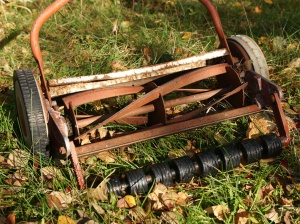How Do Lawns Affect Stormwater?
Chemical fertilizers, pesticides and herbicides (weed-killers) used
on lawns wash into the stormwater and eventually end up in the
Schuylkill and Delaware Rivers.
Fertilizers can cause algal blooms, which rob our waterways of oxygen that fish need to survive.
Pesticides and herbicides kill aquatic life in the streams and rivers and pollute our sources of drinking water.
|

Photo: Kallerna |
How Can I Reduce Stormwater Pollution From My Lawn?
Let it grow naturally! Healthy lawns can survive with only organic fertilizers and little to no pest control.
Eliminate pesticides and herbicides, which are poisonous to pets and humans as well as detrimental to the watershed, from your yard.
Weeds can be controlled by mowing, pulling by hand, or encouraging the growth of hearty native species to out-compete the weeds. See the Invasive Species Removal Fact Sheet for more information.
Don’t bag your cut grass in the summer or your leaves in the fall. Instead, spread them throughout your lawn—they will serve as a natural fertilizer.
Make your own compost from food and garden waste, or purchase locally-made compost to use as a natural fertilizer.
Use commercial organic fertilizers, which are safer and release nutrients more slowly. These can be found at nearly any garden supply store.
Use chemical fertilizers sparingly. Conduct a soil test to determine your actual fertilizer needs.
Never fertilize before a rain storm—the pollutants are picked up by stormwater and washed into our waterways.
Keep fertilizer off of paved surfaces: sidewalks, driveways, etc.
If granular fertilizer gets onto paved surfaces, collect it for later use or sweep it onto the lawn.
Wash your fertilizer spreader equipment on a pervious vegetated area, like the lawn, so additional fertilizer can be absorbed into the soil.
Never apply fertilizer to frozen ground or dormant lawns.
Maintain a buffer strip of unmowed natural vegetation bordering waterways and ponds to trap excess fertilizers and sediment from lawns/gardens.
Avoid pesticides. Instead, utilize natural and organic pesticides and Integrated Pest Management strategies, which eliminate pests by developing a healthy, diverse ecosystem in your yard.
Consider planting a tree, rain garden or wildlflower meadow to replace part of your lawn and help manage stormwater!
Green Lawn Maintenance
Non-toxic Weed Control
Organic Lawn Care
Invasive Species Removal Fact Sheet
Soil Testing
Pennsylvania Soil Fertility Testing Program
Compost and Natural Fertilizer
How to Compost at Home
Fairmount Park Compost
Bennett Compost
Philly Compost
Disclaimer
This website content is provided to you on an “AS IS” and “WITH ALL FAULTS” basis. You acknowledge that you assume the entire risk of loss in using this information, including without limitation any loss incurred by any End User. You further acknowledge that this content is complex and may contain some nonconformities, defects and/or errors. PWD does not warrant that this website will meet your needs or expectations, or that all nonconformities can or will be corrected. PWD assumes no risk, liability or responsibility for the accuracy of this guide. See full disclaimer
